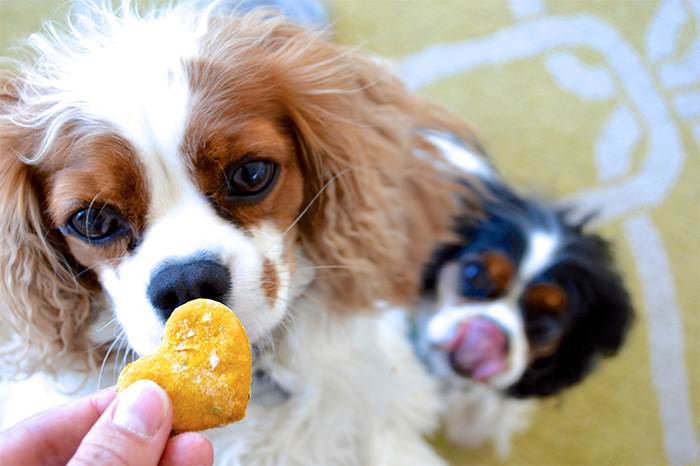While there are many food and beverages enjoyed by humans that should never be fed to dogs, such as chocolates and alcohol, many others can actually be good for your pets. The challenge lies in getting reliable information about which foods are canine-friendly and which foods are not.
Here are the types of food that your dog can safely consume. Just remember two things: first, give your pet these foods in moderation since too much of anything can be bad for the health; and second, feed your dog with high-quality commercial dog food appropriate for their age, physical condition, and growth requirements. Be sure to buy the dog food from reliable shops, too, such as Petco so as to get the real deal.
Meat and Vegetables
Most dogs love meat so it makes sense to occasionally give your pet its share of meat. Chicken, chuck steak, lean ground beef, roast, and turkey are among the best choices since these are not only tasty for dogs but also contain satisfactory amounts of protein necessary for muscle growth.
A few rules apply when giving meat so as to ensure that you dog will benefit from it:
- Always cook the meat well since raw and undercooked meat can contain harmful bacteria.
- Cut the meat into bite-sized pieces or give your pet cooked ground meat.
- Avoid the fatty portions of meat (i.e., bacon).
- Never give your dog old and spoiled meat.
Most important, remove the bones from the meat especially chicken and turkey bones since these can easily splinter into sharp pieces. Even big lamb and beef bones are not suitable for feeding to your dog since these can still have raw meat, which contain disease-causing germs. Besides, even cooked bones can splinter into smaller pieces that adversely affect your pet’s digestive tract.
Vegetables added to your dog’s diet are a great idea, too. These food items add vitamins, minerals and fiber, which are necessary for good growth.
Give your dog raw vegetables, which have been finely chopped or grated, including cucumber, carrots, zucchini, bell peppers, lettuce, celery and corn (without the cob). Steam vegetables like broccoli, cauliflower, asparagus, green beans, and hard winter squash. Never give avocado as it can lead to an upset stomach.
Pasta, Rice and Bread
Keep in mind that pasta, rice and bread should just be a treat for your dog, not its main meals as these should primarily be high-quality commercial dog food. Experts recommend giving these carbohydrate-rich foods on an occasional basis or just 5% to 10% of a dog’s diet.
- Pasta should be plain (i.e., no sauce) and cooked.
- Add brown rice to dog food for variety.
- Cut whole wheat bread or unsalted pretzels into bite-size pieces.
Homemade Dog Treats
From your pantry, you can make several homemade dog treats. Just be sure that these are just that – treats given as rewards on an occasional basis – not as main meals.
A few ideas include:
- Popsicles, which can be made from applesauce poured into an ice cube tray and frozen in the freezer. Give the treats on a hot day.
- Peanut butter pops, which are made by mixing 1 cup unsalted peanut butter, half of a ripe banana (mashed), and a little water. Drop the mixture into wax paper-lined cookie sheets and then freeze.
- Slices of hotdogs, marshmallows, and cheese are also good treats.
These treats can also be used to administer oral medication for your dog. For example, you can hide a pill inside a peanut butter pop, or a slice of hotdog, or a piece of marshmallow.
You can even use toys, such as a Kong, to combine feeding and exercising for your dog. Fill the Kong with food and let your pet lick the food out – a healthy treat and boredom buster in one. Cooked oatmeal layered with canned pumpkin puree, cottage cheese, and crushed graham cracker can be spooned into the Kong.
Holiday Foods
The holidays are usually filled with treats that your pet can also enjoy. As a responsible owner, you should be aware about the dos and don’ts of giving your pet their holiday treats. For example, don’t give your pet more treats than necessary (i.e., more than his share of treats during regular days) and do remember the following rules:
- Add tidbits like well-cooked sweet potato, green beans, and turkey in its regular food.
- Avoid giving table scraps as these can contain foods that are unsafe for canine consumption, such as garlic, onions, and milk.
- Keep alcoholic cocktails and chocolate-based food out of your dog’s reach. Both of these food items are toxic. Examples include white Russians and eggnog, both of which appear to be canine favorites.
The bottom line when it comes to feeding human food to dogs: When in doubt, just stick to high-quality commercial dog food and treats. Your dog will benefit because these have been especially formulated for their unique nutritional requirements and canine preferences.


